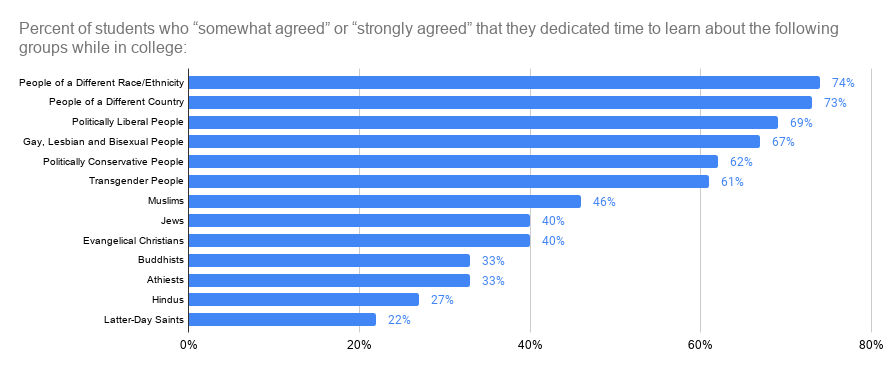You have /5 articles left.
Sign up for a free account or log in.
Many college students are not gaining the skill sets and knowledge they need to navigate a religiously diverse country, according to a new longitudinal study based on surveys of students across 122 campuses.
Less than a third (32 percent) of college students said they developed better skills to interact with people of diverse beliefs while in college, and nearly three-quarters of fourth-year students earned a grade of C or below on a short, standardized quiz testing their knowledge of eight different religious worldviews, the Interfaith Diversity Experiences and Attitudes Longitudinal Survey (IDEALS) found. The survey was led by researchers at North Carolina State and Ohio State Universities and Interfaith Youth Corps, a nonprofit organization.
Researchers found that student participation in formal courses and activities that build interfaith skills is low and, in some cases, declined over students' college years. And while nearly three-quarters of students in college agreed with the statement that they dedicated time in college to learning about people of a different race or ethnicity (74 percent) or from a different country (73 percent), far lower percentages said they dedicated time to learning about people of different religions.

"I think that conversations about equity, inclusion and diversity need to start including ideas related to religion," said Matthew Mayhew, co-principal investigator for the survey and the William Ray and Marie Adamson Flesher Professor of Educational Administration at Ohio State. "It’s been on the periphery for a while, but now I think we need to take it seriously."
He noted that when asked about where and how they spend their time thinking about different issues, students gave low priority to religion.
"Religion is at the bottom of a list that includes race, international students, LGBT issues, you name it. Religion always comes last," he said. "I’m not trying to create a situation where religion competes -- rather, one where we take it seriously. Any course on diversity needs to start to include religion as part of the curriculum."
Alyssa Rockenbach, the other co-principal investigator of the study, said the survey also revealed an interest among students in engaging with religious diversity and points the way toward opportunities for further engagement.
"About 70 percent of college seniors value bridging religious divides. They say they are committed to that, that they have a great deal of respect for people of other perspectives and worldviews, so that’s very promising," said Rockenbach, a professor of higher education and Alumni Distinguished Graduate Professor at North Carolina State. "But at the same time, when you look at their behaviors, we see that the numbers of students are much lower in terms of … actually acting on their values. For example, just a quarter [26 percent] of students have taken a religion course that helps them to think about religious diversity. Only 9 percent have participated in religious diversity training on campus. What this suggests to me is some students are taking advantage of those opportunities but they’re not widespread, and institutions could do a better job of providing those opportunities and encouraging students to get involved to help them bring their actions and their values into greater alignment.”
The report makes a number of recommendations, including making interfaith experiences mandatory for students. The report states that "students are more likely to develop interfaith competencies when they have at least one curricular experience focused on religious diversity while in college. Participating in at least two structured interfaith activities outside the classroom is also impactful, especially when those activities occur in the first collegiate year."
Among the findings:
Interfaith friendships: While the vast majority (93 percent) of fourth-year college students report having at least one friendship with a person from another faith, these friendships rarely result in deep discussion of religious differences: 59 percent of fourth-year students report never having had a disagreement with a friend about religion. The researchers suggest they may lack the confidence to do so. Only 65 percent of fourth-year college students said they felt confident navigating conversations involving deep disagreements.
"We do not know definitively why more students are not discussing religious differences with their peers, but we do know that their hesitancy extends beyond the bounds of interfaith friendships," the report on the survey results states. "While a large majority of students have positive regard for others even when they deeply disagree with their beliefs (82 percent), a smaller number actively try to identify common values with people holding different religious perspectives (78 percent) and even fewer (65 percent) try to build relationships with people whose beliefs differ from their own."
Campus climate: The percentage of students who agreed that their campus is welcoming of religious diversity varied across members of different religious groups. Just 27 percent of Jewish students said their campuses were welcoming of religious diversity, compared to 37 percent of Buddhists, 38 percent of Hindus, 54 percent of Latter-day Saints and 58 percent of Muslims.
"Meanwhile, half of all Christian students did not believe their campuses were receptive to religious diversity overall," the report states. "Perhaps surprisingly, evangelical (23 percent) and Catholic (22 percent) students felt pressured to limit expression of their religious beliefs almost as often as their Jewish and Muslim peers did. Twenty-six percent of evangelicals also reported feeling compelled to separate their religious beliefs from their academic experience, higher than every other group except Hindus (36 percent)."
Buddhists were least likely to say they felt safe expressing their beliefs on campus (67 percent) or in class (53 percent). Less than half of Hindus (47 percent) and students of other minority religions (45 percent) said faculty and staff offered them religious accommodations.
"Nearly one-fifth of students from other minority religions beyond Buddhism, Hinduism, Islam, and Judaism did not feel there was a place on campus where they could express their worldview (compared to only 6 percent of all students who felt the same way)," the report states.
Political identity groups: In addition to religious views, students were also surveyed about their attitudes toward a variety of identity groups, including political liberals and conservatives. The authors found, "with some exceptions," that positive attitudes toward politically liberal students generally increased while students were in college, while positive attitudes toward political conservative students increased during students' first year of college but declined to precollege levels thereafter.
The survey was administered three times during students' college careers, in 2015, 2016 and 2019, a time frame the report describes as "an especially volatile political period when a highly polarizing presidential administration took office."
"A lot of people have demonized higher education, suggesting it has a liberalizing, indoctrinating effect," but that was not the case in students' first year of college, said Mayhew. He said it's an open question why students' views of political conservatives changed for the worse after the first year.
"The students were in the same college; they didn’t change schools. So something must have happened that motivated students to think differently about conservative ideologies," Mayhew said.








